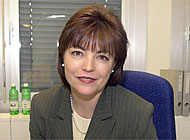Swiss anti-money laundering unit says banking secrecy is no hindrance

The new head of Switzerland's anti-money laundering unit, Judith Voney, has defended the country's banking secrecy laws. She said they presented no threat to the fight against financial crime.
In an interview with the German-language “Berner Zeitung” newspaper, the head of the Money Laundering Reporting Office Switzerland said information on individual bank accounts was readily available whenever the courts requested it.
“Banking secrecy can be lifted if a judge demands it,” explained Voney.
Switzerland has come under fire, notably from France and the United States, for not doing enough to tackle money laundering, with the country’s banking secrecy laws blamed as a major weakness.
However, according to Voney, it was inquiries carried out beyond Switzerland’s borders which represented the biggest headache for Swiss investigators.
With money laundering now a global issue, she stressed it was vital that Switzerland strengthened its ties with crime-fighting counterparts around the world. However she conceded that this was a lot easier to achieve with some countries than with others.
MROS, which is a division of the Federal Office for Police, is increasingly finding itself in the vanguard of Swiss efforts to stem the rising tide of money laundering cases.
Under the country’s money laundering laws, financial institutions are required to report any activity which may constitute money laundering to MROS.
The Bern-based office collates and analyses all data, and once there is reasonable suspicion that money laundering is taking place, it forwards the information to the appropriate cantonal authorities.
In 1999-2000, 370 reports relating to more than SFr1.5 billion of suspect cash were received by MROS – more than double the figure for the previous year.
In its second annual report, the organisation’s former head, Daniel Thelesklaf, argued that the surge in the number of cases proved that money launderers could no longer remain anonymous in Switzerland.
“It is proof that the laws and regulations are actually being put into effect by a large number of players in the Swiss financial world,” he said.
swissinfo with agencies

In compliance with the JTI standards
More: SWI swissinfo.ch certified by the Journalism Trust Initiative








You can find an overview of ongoing debates with our journalists here . Please join us!
If you want to start a conversation about a topic raised in this article or want to report factual errors, email us at english@swissinfo.ch.